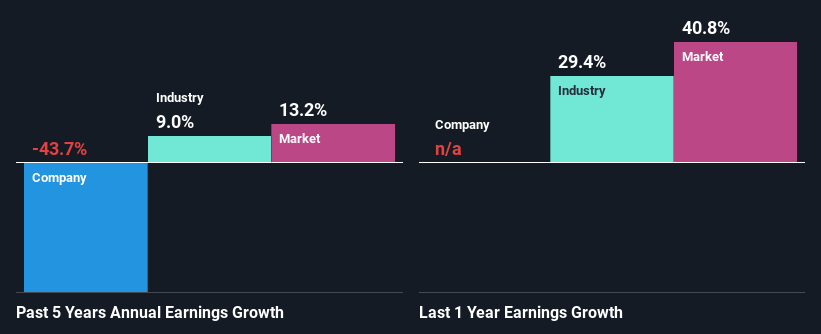Alpine Income Property Trust, Inc. (NYSE:PINE) Stock's On A Decline: Are Poor Fundamentals The Cause?
With its stock down 5.0% over the past week, it is easy to disregard Alpine Income Property Trust (NYSE:PINE). Given that stock prices are usually driven by a company’s fundamentals over the long term, which in this case look pretty weak, we decided to study the company's key financial indicators. Particularly, we will be paying attention to Alpine Income Property Trust's ROE today.
Return on Equity or ROE is a test of how effectively a company is growing its value and managing investors’ money. In short, ROE shows the profit each dollar generates with respect to its shareholder investments.
See our latest analysis for Alpine Income Property Trust
How Do You Calculate Return On Equity?
The formula for return on equity is:
Return on Equity = Net Profit (from continuing operations) ÷ Shareholders' Equity
So, based on the above formula, the ROE for Alpine Income Property Trust is:
1.0% = US$2.1m ÷ US$217m (Based on the trailing twelve months to September 2021).
The 'return' is the amount earned after tax over the last twelve months. That means that for every $1 worth of shareholders' equity, the company generated $0.01 in profit.
What Has ROE Got To Do With Earnings Growth?
So far, we've learned that ROE is a measure of a company's profitability. Based on how much of its profits the company chooses to reinvest or "retain", we are then able to evaluate a company's future ability to generate profits. Assuming all else is equal, companies that have both a higher return on equity and higher profit retention are usually the ones that have a higher growth rate when compared to companies that don't have the same features.
Alpine Income Property Trust's Earnings Growth And 1.0% ROE
As you can see, Alpine Income Property Trust's ROE looks pretty weak. Even when compared to the industry average of 6.5%, the ROE figure is pretty disappointing. Therefore, it might not be wrong to say that the five year net income decline of 44% seen by Alpine Income Property Trust was possibly a result of it having a lower ROE. However, there could also be other factors causing the earnings to decline. For instance, the company has a very high payout ratio, or is faced with competitive pressures.
So, as a next step, we compared Alpine Income Property Trust's performance against the industry and were disappointed to discover that while the company has been shrinking its earnings, the industry has been growing its earnings at a rate of 9.0% in the same period.
The basis for attaching value to a company is, to a great extent, tied to its earnings growth. The investor should try to establish if the expected growth or decline in earnings, whichever the case may be, is priced in. Doing so will help them establish if the stock's future looks promising or ominous. Is Alpine Income Property Trust fairly valued compared to other companies? These 3 valuation measures might help you decide.
Is Alpine Income Property Trust Making Efficient Use Of Its Profits?
Alpine Income Property Trust has a very high three-year median payout ratio of 52%, implying that it retains only 48% of its profits. However, it's not unusual to see a REIT with such a high payout ratio mainly due to statutory requirements. So this probably explains the company's shrinking earnings.
Only recently, Alpine Income Property Trust stated paying a dividend. This likely means that the management might have concluded that its shareholders have a strong preference for dividends. Looking at the current analyst consensus data, we can see that the company's future payout ratio is expected to rise to 75% over the next three years.
Summary
Overall, we would be extremely cautious before making any decision on Alpine Income Property Trust. The company has seen a lack of earnings growth as a result of retaining very little profits and whatever little it does retain, is being reinvested at a very low rate of return. Additionally, the latest industry analyst forecasts show that analysts expect the company's earnings to continue to shrink in the future. Are these analysts expectations based on the broad expectations for the industry, or on the company's fundamentals? Click here to be taken to our analyst's forecasts page for the company.
This article by Simply Wall St is general in nature. We provide commentary based on historical data and analyst forecasts only using an unbiased methodology and our articles are not intended to be financial advice. It does not constitute a recommendation to buy or sell any stock, and does not take account of your objectives, or your financial situation. We aim to bring you long-term focused analysis driven by fundamental data. Note that our analysis may not factor in the latest price-sensitive company announcements or qualitative material. Simply Wall St has no position in any stocks mentioned.
Have feedback on this article? Concerned about the content? Get in touch with us directly. Alternatively, email editorial-team (at) simplywallst.com.

 Yahoo Finance
Yahoo Finance 
